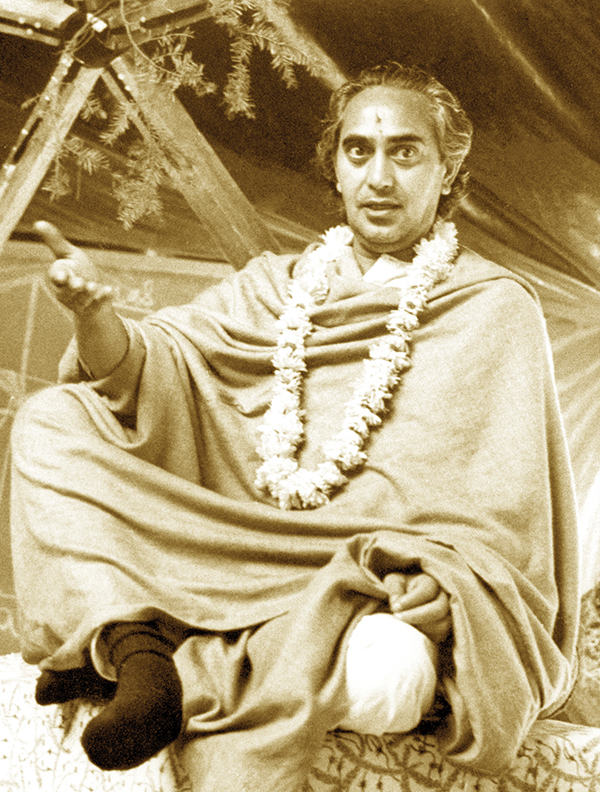We forget the true aim of our life and get involved—“This is mine, this is not mine.” Have everything. Don’t deny yourself. But don’t forget the ultimate Reality, your goal. Then, whatever you have, you’ll enjoy those things. You’ll make them as means. So teacher says, “You should know how to live in the world. Learn to enjoy the world. World is not enjoyed by cowards. Vira bhogya vasundhara.” The world is enjoyed only by one who is brave, who can face life. Life is not a bed of roses. And if you think it is a bed of roses, remember roses have thorns, too. A good competent teacher prepares his student, keeps that fire alive, makes him aware that the aim of life should not be forgotten. Enjoy all the things of the world, make them means. Nothing is an end in itself, not wealth, not beauty, not name and fame, not even learning. The true goal is that peace and happiness which is everlasting. “It is not limited to the senses, my son,” the teacher says. He leads you and introduces you to the path of light which is inward. He makes you aware that there is a light within you. That light is higher than sun, moon, and stars. That light is mingled with consciousness. It is not a dumb light. It’s not the light of the bulb. It’s not the light of the sun, moon, or stars. It is the light of inner intelligence and brilliance. And where is it? Is it outside you? No. It’s within you. So he makes you aware of this fact. He leads you on the path of contemplation, meditation and prayer. The knowledge that flows through the guru, does not belong to him. But he is only a transmitter and receiver. That someone who has become receiver and transmitter, is also called guru. But actually, Guru, highest of all truths, is within you, from where the source of brilliance and intelligence flows on various degrees and grades. This outer guru, a competent teacher guides you through his scriptural knowledge and experience and makes you aware of the Guru within you. He helps you, and always forgives you, no matter what you do.
I was asked to go the West, first to Germany. All the swamis from our cave, those swamis who used to beat me up and were not happy with my behavior because I used to tease them and trouble them, started crying that day, saying, “Our kid is leaving.” I too missed them. And after seven days I could not remain without them and went back. My master said, “He is returning.” The swamis asked, “What shall we do? Shall we receive him?” He said, “No. Nobody should talk to him.” He turned towards the wall and wouldn’t see me, wouldn’t talk to me. “I told you to go to Germany and start doing my mission, serving others. And you have come back because you are attached to us.” Without water or food they kicked me out of that place. And they said, “We love you! But you are not supposed to be attached to us. You are supposed to do your work and serve others.”
I left that Garden of Eden, in the Himalayas, where I used to converse with the snowy blanketed mountains, cross the glacial streams, and talk to the wonderful cool breezes. My master told me, “All the mistakes that you commit, they are yours; you reap their fruits. All the good that you give is from the tradition. You are not allowed to reap these fruits. When I am teaching you something, I assure you, I am not obliging you. I am doing my duty as a messenger, as a spokesman, as a transmitter. So you are not obliged to me in any way. Never feel that way. But you have right to take the best I have and leave the rest which is not useful for you.” With this understanding, if you learn anything from your teacher, you’ll never be deceived. Best student is he who takes from the teacher—not he who gives. The scripture also tells you what you should give to your teacher. It is never said that you should give a large check, your entire bank balance. No! You give dry twigs—a bundle of dry twigs to your teacher. That’s the symbol that “I have nothing to give you. You don’t need anything for yourself. I know I cannot do anything for you. These dry twigs represent my karmas. There are some samskaras which are very hard on me, trouble me, torture me. Will you please burn them?” Has he got power to do this? Yes. But it’s not his power. He uses the power of the tradition to help the student. It’s not his power.
What I mean to say, I have nothing to give you on this day except that love which was given to me.
© HIHT. All rights reserved.

